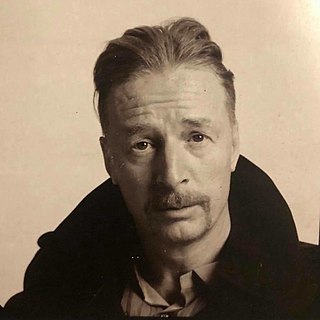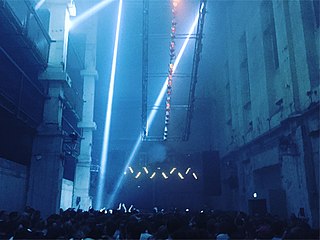Related Research Articles

A rave is a dance party at a warehouse, club, or other public or private venue, typically featuring performances by DJs playing electronic dance music. The style is most associated with the early 1990s dance music scene when DJs played at illegal events in musical styles dominated by electronic dance music from a wide range of sub-genres, including techno, hardcore, house, and alternative dance. Occasionally live musicians have been known to perform at raves, in addition to other types of performance artists such as go-go dancers and fire dancers. The music is amplified with a large, powerful sound reinforcement system, typically with large subwoofers to produce a deep bass sound. The music is often accompanied by laser light shows, projected coloured images, visual effects and fog machines.

Tresor is an underground techno nightclub in Berlin and a record label.

Helmut Josef Geier, known professionally as DJ Hell, is a German DJ.

E-Werk was a techno music club in Berlin, Germany that was held in a former electrical substation called Abspannwerk Buchhändlerhof. Located near Checkpoint Charlie, it was an influential club in the techno subculture from 1993 to 1997 and was eventually transformed into an all-purpose venue.
German electronic music is a broad musical genre encompassing specific styles such as Electroclash, trance, krautrock and schranz. It is widely considered to have emerged in the late 1960s and early 1970s, becoming increasingly popular in subsequent decades. Originally minimalistic style of electronic music developed into psychedelic and prog rock aspects, techno and electronic dance music. Notable artists include Kraftwerk, Can, Tangerine Dream and Deutsch Amerikanische Freundschaft. German electronic music contributed to a global transition of electronic music from underground art to an international phenomenon, with festivals such as Love Parade, Winterworld and MayDay gaining prominence alongside raves and clubs.

Matrix is a nightclub in Berlin which opened in 1996. The large-scale discothèque is located at Warschauer Platz 18 in ten basement vaults of the Warschauer Straße railway station. It houses up to nine bars and five dance floors, as well as an outdoor area. The venue has an overall size of 2,100 square meters, and is one of the biggest nightclubs in Berlin. In Germany, the club is known as one of the filming locations of the soap opera Berlin – Tag & Nacht of the channel RTL 2.

A nightclub is an entertainment venue during nighttime comprising a dance floor, lightshow, and a stage for live music or a disc jockey (DJ) who plays recorded music. Nightclubs are smaller than live music venues like theaters and stadiums. Often there are few or no seats in a club.
Techno is a genre of electronic dance music (EDM) which is generally produced for use in a continuous DJ set, with tempo often varying between 120 and 150 beats per minute (bpm). The central rhythm is typically in common time (4/4) and often characterized by a repetitive four on the floor beat. Artists may use electronic instruments such as drum machines, sequencers, and synthesizers, as well as digital audio workstations. Drum machines from the 1980s such as Roland's TR-808 and TR-909 are highly prized, and software emulations of such retro instruments are popular.

Thomas Andrezak, better known as Tanith, is a German DJ and producer of electronic dance music. From 1990 to 1996 he was one of the most popular German Tekkno DJs.

Helene Hegemann is a German writer, director, and actress. As a young writer her work was highly praised, but her first novel, Axolotl Roadkill, sparked a plagiarism controversy. The book has since been translated in various languages.

Fabian Lenz is a German DJ, Techno musician and events producer, who was also known before under the moniker DJ Dick.

Berlin Atonal is an annual festival for sonic and visual art in two distinct stages. It first took place between 1982 and 1990, relaunching in 2013 under new direction and continuing to the present day. The festival presents contemporary, interdisciplinary projects at the intersection of sound art, visual and media art, installation and performance, with an emphasis on commissioned work and world premieres. Apart from the annual event, Berlin Atonal has presented other satellite events such as The Long Now, New Assembly in Tokyo, and has collaborated with Deutsches Symphonie-Orchester, Dark Mofo and Berliner Festspiele.

Quasimodo is a music venue in the Charlottenburg district of Berlin. It is located on the corner of Kantstraße and Fasanenstraße in the basement of the building of the Delphi Filmpalast, a former dance hall and movie theater which is also home to the Quasimodo Café and the Vaganten Bühne theatre. The club offers accommodation for up to 350 seated guests. Rock, Latin music and world music are also presented in concerts along with its more traditional emphasis on modern jazz, blues, soul and funk. Its programme features renowned international artists as well as musicians from the local Berlin and national scene.

Knaack was a nightclub in Prenzlauer Berg in Berlin, Germany. It opened in 1952 as a youth club and occasional disco. It then developed during the East German era into a live music venue where many notable German bands played regularly. Gentrification of the surrounding area in the late 2000s led to complaints about the club's noise from residents of newly constructed apartment buildings nearby. A court case resulted, placing restrictions on the noise levels, which the owners judged made the club financially untenable, resulting in its closure on 31 December 2010. After efforts to reopen in another district, the club secured new premises in Prenzlauer Berg and announced in February 2013 that they planned to reopen in 2016. Delays due to construction permits pushed these plans back to 2018. As of 2023 no construction has begun.

Dietmar-Maria "Dimitri" Hegemann is a German nightclub owner, cultural activist and community organizer, currently living and working in Berlin, Germany.

Dixon is a German musician, best known as a house and techno DJ and producer, as well founder of record label Innervisions, based in Berlin. In recent years, he has also made endeavours into fashion and technology, and is the joint owner of club-wear clothing brand Together We Dance Alone. In 2019 he launched an Ibiza residency and digital platform of the same name, Transmoderna. Dixon was voted as the number one DJ on Resident Advisor's Top 100 DJ Poll every year from 2013 to the last annual poll in 2016.

MMA Club(Mixed Munich Arts Club) was a techno nightclub in Munich, Germany, renowned as one of the best in Germany in the 2010s. It was a multifaceted establishment based inside the husk of an old thermal power plant and has hosted underground techno DJs such as Richie Hawtin, Adam Beyer, Len Faki, Ben Klock, Marcel Dettmann, Ben Sims or Terence Fixmer, among many others. The maze-like club also contained a 460-square-meter gallery space frequently utilized for a variety of theatrical, artistic and orchestral performances.

Ultraschall was a nightclub in Munich, Germany from 1994 to 2003. The techno club belonged, besides the Tresor and E-Werk in Berlin, the Dorian Gray and Omen in Frankfurt, and the Munich-based clubs KW – Das Heizkraftwerk, Natraj Temple and Millennium, to the most renowned clubs of Germany's 1990s techno culture. According to FazeMag, Ultraschall was "for many techno fans the most authentic techno club alongside the Tresor".

KW – Das Heizkraftwerk was a nightclub in Munich, Germany from 1996 to 2003. The techno club belonged, besides the Tresor and E-Werk in Berlin, the Dorian Gray and Omen in Frankfurt, and the Munich-based clubs Ultraschall, Natraj Temple and Millennium, to the most renowned clubs of Germany's 1990s techno culture.

Bar 25 was a bar, open-air club and cultural venue on the banks of the Spree river in Berlin's Friedrichshain district.
References
- ↑ Techno-DJs gaben Berlin einen Endlos-Rhythmus Berliner Morgenpost October 30, 2009 (in German)
- 1 2 Techno - Entwicklungen und Erscheinungsformen einer Jugendkultur Archived 2011-08-23 at the Wayback Machine Work for the Proseminar "Communication and Media Law: Youth and Media"(in German)
- 1 2 Plötzlich war jeden Tag Party Tagesspiegel November 8, 2009 (in German)
- ↑ Robb, David (2002) Techno in Germany: Its Musical Origins and Cultural Relevance
- 1 2 Ein Geheimzirkel erobert die Welt - Die Pioniertage des Techno From Zeitgeschichten on Spiegel-Online (in German)
- ↑ Mit ignoranter Coolness Berliner Zeitung November 7, 2009 (in German)
- ↑ Sechs Jahre Tresor Records De:Bug (in German)
- 1 2 "Die ganze Stadt schreit »Party!«" Die Zeit May 23, 2007 (in German)
- ↑ Dimitri Hegemann - Past, Present, Future Raveline October 28, 2009 (in German)
- 1 2 Techno-Club Tresor: Die Stahltür fällt zu Der Spiegel April 15, 2005 (in German)
- ↑ Eine 20-jährige Ost-West-Reise The European November 18, 2009 (in German)
- ↑ Chaosradio Express 136 Interview with Tanith about Techno in Chaosradio (in German)
- ↑ Tanith in the Intro-Künsterbiografie (in German)
- ↑ Boom boom boom: Techno in Germany after the Wall